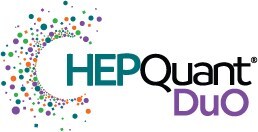HepQuant, a leader in developing noninvasive, blood-based, quantitative testing to assess liver health, announces promising findings from a study utilizing the HepQuant DuO test to evaluate the impact of resmetirom treatment in patients with metabolic dysfunction-associated steatohepatitis (MASH)-related Child-Pugh A cirrhosis. In the peer-reviewed publication, 83% of patients showed either stability or improvement in liver function, as measured by DSI, after 48 weeks.
DENVER, Oct. 14, 2025 /PRNewswire-PRWeb/ -- HepQuant, a leader in developing noninvasive, blood-based, quantitative testing to assess liver health, announces promising findings from a study utilizing the HepQuant DuO test to evaluate the impact of resmetirom treatment in patients with metabolic dysfunction-associated steatohepatitis (MASH)-related Child-Pugh A cirrhosis. The HepQuant DuO® test measures critical liver cell processes and blood flow to the liver to assess disease severity, progression, and improvement. The study, conducted as part of the Madrigal Phase 3 MAESTRO-NAFLD-1 trial, highlights the potential of the HepQuant DuO test to assess liver health and estimate clinical risk reduction in response to treatment. Results from the test, including Disease Severity Index (DSI), SHUNT%, and Risk for Adverse Clinical Events (RISK ACE), may provide early estimates of potential clinical benefit with resmetirom treatment.
Subset analysis from the study, published in Gastro Hep Advances, involved 32 patients with well-compensated (Child Pugh A) MASH cirrhosis, 23 of whom were studied with HepQuant DuO at baseline and weeks 28 and 48 of resmetirom treatment.(1) DSI results demonstrated that resmetirom treatment led to improvements in liver health and reduction in the estimated risk of clinical outcomes:
- Improvement in Liver Health: 83% of patients showed either stability or improvement in liver function, as measured by DSI, after 48 weeks.
- Responder Analysis: The proportion of responders (patients with a >2-point decrease in DSI) increased by three-fold between Week 28 and Week 48, indicating a treatment effect over time.
- Clinical Risk Reduction: RISK ACE results estimated the decrease in risk of clinical outcomes by 36% after 48 weeks of treatment, with the greatest benefit observed in patients with the highest baseline DSI (>23).(2)
- Estimated Risk matched Actual: The estimated 2 year event rate predicted to be 7% in this subset analysis matched that of the greater cohort (N=122) presented at the 2025 EASL International Liver Conference in Amsterdam.(2)
"These findings demonstrate the utility of the HepQuant DuO test for quantifying liver health and monitoring treatment response in patients with MASH cirrhosis," said Dr. Gregory T. Everson, Chief Executive Officer of HepQuant and corresponding author of the study. "The ability to identify responders and track clinical risk reduction early in the course of therapy provides a significant advancement in optimizing treatment for this growing patient population. The observed RISK ACE Score in a subset of patients estimated and mirrored the actual event rate in the larger cohort is supportive of the utility of HepQuant DuO as a drug development tool that can be deployed into smaller studies to estimate outcomes in the larger clinical trials."
This study also highlights the broad spectrum of hepatic impairment and portal-systemic shunting in MASH cirrhosis patients, emphasizing the need for individualized treatment approaches. Additional studies evaluating HepQuant DuO DSI, SHUNT%, and RISK ACE in larger, diverse populations and liver disease etiologies for this application are warranted.
1. Alkhouri, Naim et al. "The Cholate Challenge Test Quantified Baseline Functional Heterogeneity and Improvement in Response to Resmetirom in MASH-related Child Pugh A Cirrhosis." Gastro Hep Advances, Volume4, Issue 10, 2025, 100785. https://doi.org/10.1016/j.gastha.2025.100785
2. Alkhouri N, et al. Presented at Late Breaker Session EASL ILC. 2025. J Hepatol 82 (S1): S9-10.
About HepQuant
HepQuant has developed noninvasive, blood-based, quantitative tests that assess liver health by measuring critical liver cell processes and blood flow to the liver. Our test results, in conjunction with other clinical assessments, inform healthcare providers' clinical decisions to achieve more effective management of patients with advanced liver disease. Knowing where a patient falls on the disease spectrum informs personalized treatment decisions for that individual. HepQuant is a privately held diagnostics company based in Denver, Colorado. Learn more at HepQuant.com.
HepQuant DuO is a Laboratory Developed Test (LDT).
This test was developed and its performance characteristics determined by HepQuant, LLC in a manner consistent with CLIA requirements. This test has not been cleared or approved by the U.S. Food and Drug Administration.
Media Contact
Joellyn Enos, HepQuant, 1 303-268-7069, [email protected], https://hepquant.com/
SOURCE HepQuant



Share this article